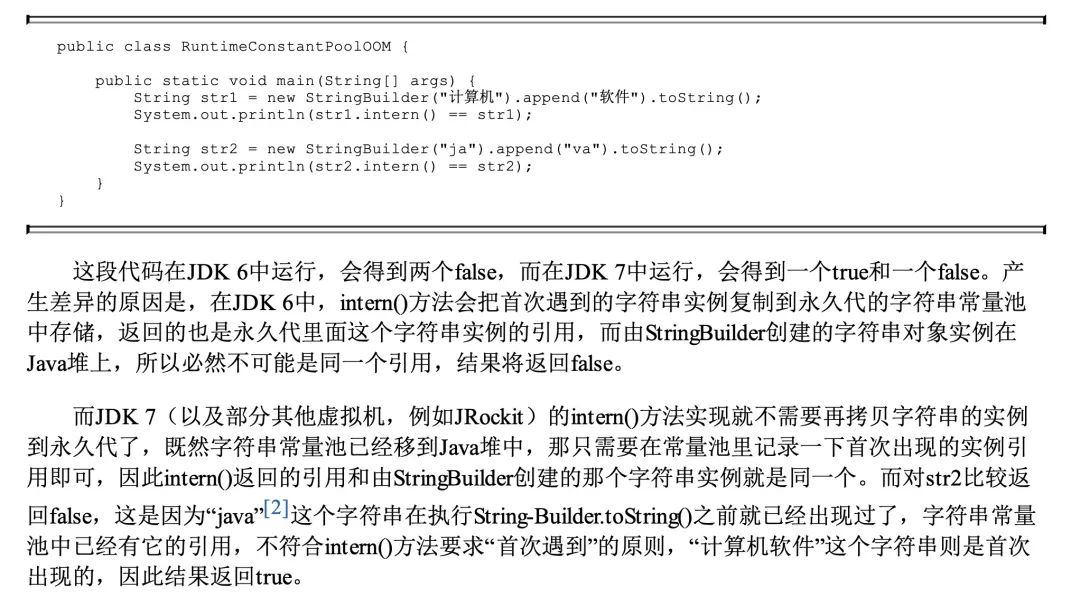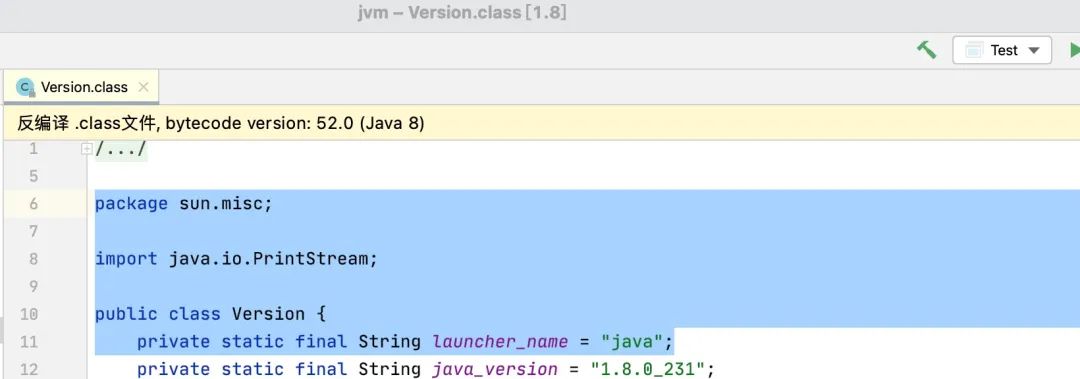String s = new String("java"); 只创建了一个对象!好好看好好学,要了解原理!
public static void main(String[] args) {
String str1 = new StringBuilder("计算机").append("软件").toString();
System.out.println(str1.intern() == str1);
String str2 = new StringBuilder("ja").append("va").toString();
System.out.println(str2.intern() == str2);
}
这个题目是在《深入理解Java虚拟机:JVM高级特性与实战(第3版)》看到的,按理说这两个结果不应该一样吗?为什么会出这种题呢?


作者想告诉我,一次不信,两次你应该信了吧!机智如我。为了证明我如此机智,我特地的试了一下。


为什么?为什么?为什么?你要离开我!(不好意思串台了)。为什么是true和flase。

吧啦吧啦吧啦说了一大堆,意思就是想让读者知道,字符串常量池jdk1.6和jdk1.7及以上存放的位置变啦,以前放到永久代的,以后就放在java堆上了。jdk1.6的intern()的方法首次遇到会把字符串复制一份到有永久代,而jdk1.7及以上的只需要在常量池里记录一下首次出现的实例引用。"只需要在常量池里记录一下首次出现的实例引用"说白了就是常量池记录第一次出现这个字符串的地址。其实我这地方有个好奇,那不就是这个对象永久不会被垃圾收集器收集了嘛?当然我也不敢问。。。
既然都说到这了,那就一起看看intern()方法吧!(jdk1.8)

/**
* Returns a canonical representation for the string object.
*
* A pool of strings, initially empty, is maintained privately by the
* class {@code String}.
*
* When the intern method is invoked, if the pool already contains a
* string equal to this {@code String} object as determined by
* the {@link #equals(Object)} method, then the string from the pool is
* returned. Otherwise, this {@code String} object is added to the
* pool and a reference to this {@code String} object is returned.
*
* It follows that for any two strings {@code s} and {@code t},
* {@code s.intern() == t.intern()} is {@code true}
* if and only if {@code s.equals(t)} is {@code true}.
*
* All literal strings and string-valued constant expressions are
* interned. String literals are defined in section 3.10.5 of the
* The Java™ Language Specification.
*
* @return a string that has the same contents as this string, but is
* guaranteed to be from a pool of unique strings.
*/
public native String intern();
原谅我看不懂,所以谷歌翻译了下。其实意思就是调用intern方法时,如果池中已经包含一个等于此对象的字符串,此方法,则从池中取出字符串返回。否则,此对象地址将添加到池,并返回对此对象的引用。 额,和上面一个意思。
叽叽歪歪说了半天,我知道第一个是true,我是问你第二个为什么是false,光说屁话。

老爷们别生气,我这就慢慢给你道来。其实我也不知道。然后在知乎看到一片文章《如何理解《深入理解java虚拟机》第二版中对String.intern()方法的讲解中所举的例子?》,呵呵哒,原来在初始化的时候已经把java这个字符串放到常量池中了。

你说这不巧了吗?

举个例子让我怀疑了人生,哎。。。
哎,别先,如果我发现了一个面试题,String s = new String("s")证明他是创建两个对象的了,哈哈哈哈。。。

public static void main(String[] args) {
String s = new String("s");
System.out.println(s.intern() == s);
}
结果是false,那不就是创建了两个对象吗?第一个是new String("s"),第二个是常量池的s。哈哈哈哈。
小编小编,那你怎么证明java启动的时候常量池里面没有s呢?毕竟java这个字符串一开始也存在常量池啊!
额。。。

我又想到一个有意思的问题,String s = new String("java")创建了几个对象,哈哈哈哈,它创建了一个对象,这次没人反驳我了把。哈哈哈哈~
